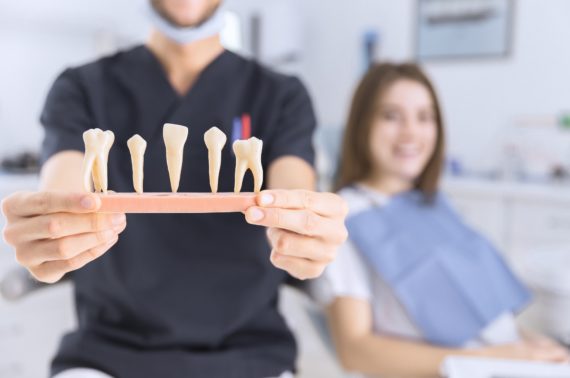Gum Disease
Gum disease (periodontal disease) is a when the gums surrounding your teeth are infected by excessive plaque buildup, which is the sticky substance of bacteria that forms on the surface of your teeth. It’s also one of the major reasons that explain tooth loss in adults. Most people do not experience pain from the disease so it can be difficult to tell if there’s infection present. It’s important to schedule regular dental cleanings and checkups with your dentist as he or she will be able to identify gum disease in an earlier stage before it has the chance to get worse.
What Are the Stages of Periodontal Disease?
Gum disease can be prevented with regular flossing, brushing, and visiting your dentist once every six months. If plaque is not properly removed from your teeth, it will increase and release toxins that will further damage your gums. There are also two stage of periodontal disease, both of which are provided below:
Factors that Increase a Patient’s Likelihood of Developing Periodontal Disease
- Smoking or using chewing tobacco
- Diabetes
- Medication (steroids, anti-epilepsy drugs, cancer therapy drugs, calcium channel blockers, and oral contraceptives)
- Bridges that don’t provide the proper fit
- Crooked teeth
- Old fillings
- Pregnancy


Gum Infection Symptoms
Can’t remember your last dental checkup? There are a number of symptoms that may help you determine whether or not you have a gum infection. If you are experiencing any of these symptoms below, we recommend that you see your dentist immediately to prevent any more damage.
- Bleeding gums
- Gums have reddened, become tender, and are swollen
- Gums are beginning to pull away from your teeth
- Bad breath
- Unpleasant taste
- Pus forming between your teeth and gums
- Loose permanent teeth
- Changes with how your teeth fit together when you bite
- Changes with the fit of your partial dentures
Gum Disease Treatment Options
Gum disease treatment options may vary from patient to patient but it solely depends on the extent of damage for each individual. Treatments you can expect to receive with gum disease are nonsurgical treatments (at-home periodontal trays, scaling and root planing, and deep cleaning), periodontal surgery and laser gum surgery, and even dental implants.
In addition to daily brushing and flossing, scheduling regular dental checkups and periodontal exams at Smiles at Reston Heights will ensure you maintain excellent oral health! Our dentists can teach you the best practices for maintaining good oral hygiene and reduce your chances of getting gum disease. As our top priority is helping you maintain a healthy smile, we will perform efficient and affordable teeth cleanings and checkups suited to your exact needs.
